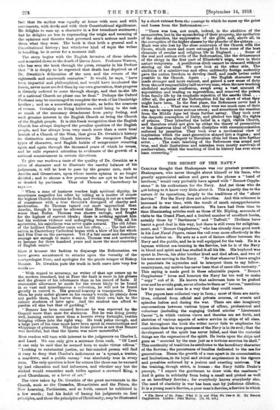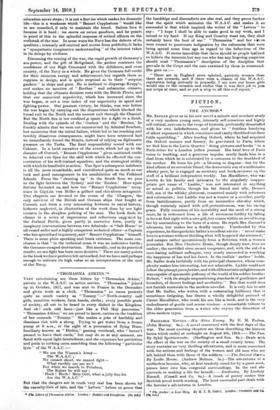THE SECRET OF THE NAVY.*
OARLYLB thought that Shakespeare was our greatest possession. Shakespeare, who never thought about himself or his fame, who greatly appreciated sailors and gave us the phrase a " band of brothers," would very probably have agreed with " Bennet Copple. stone " in his enthusiasm for the Navy. And yet those who do not belong to it know very little about it. This is partly due to the nature of its operations, largely to the traditions of the " silent Service." For the Navy does not advertise. And this reticence is increased in war time, with the result of much misapprehension about its duties and achievements. We have had from time to time illuminating articles such as those of Mr. Kipling, accounts of visits to the Grand Fleet, and a limited number of excellent books, notably those by " I3artimeus " and " Taffrail." Civilians have learnt a good deal in this way, but there is still room for enlighten- ment, and " Bennet Copplestone," who has already done good work in his Lost Naval Papers, raises the veil even more effectively in the volume before us. He acts as a sort of liaison officer between the Navy and the public, and he is well equipped for the task. He is a layman without sea-training in the Service, but he is of the Navy in blood and spirit and has studied it his life. His boyhood was spent in Devon, his elder brother lived and died afloat, and two of his sons are serving in the Navy. " So that whenever I have sought to penetrate its mysteries and to interpret them to my fellow- countrymen, my motive has never been that of mere idle curiosity." This saying is made good in these admirable papers. " Bennet Copplestone " loves and honours the Navy far too well to make " oopy " out of it. He knows that sailormen hate to be gushed over and he avoids gush, never alludes to them as " heroes," mentions few by name and none in a way that they could resent.
The papers here collected vary in form ; most of them are narra- tives, collated from official and private sources, of events and episodes before and during the war. There are also imaginary conversations between various types of officer, professional and volunteer (including the engaging Oxford scholar " Lieutenant Caesar "), in which various views and theories are set forth, and sketches of various aspects of active service in ships of all sizes. But throughout the book the writer never fails to emphasize his conviction that the true greatness of the Navy is in its soul ; that the development of the spirit has never failed, and that the material things are the expression of the spirit. He looks upon the ships and guns as " secreted by the men just as a tortoise secretes its shell." This continuity of tradition he attributes to the hereditary character of the Service; the persistence of families dedicated to the sea for generations. Hence the growth of a race apart in its concentration and limitations, in its loyal and stoical acquiescence in the rigours and penalties enforced by a jealous and exacting mistress. Ye$ the training, though strict, is human : the Navy fulfils Drake's precept, " I expect the gentlemen to draw with the mariners." And it gains in solidarity from being a small and picked as well as an hereditary Service ; for everybody knows everybody else. The need of elasticity in war has been met by judicious dilution. It is a young man's Service, a poor man's Service, a Service in which • The. Sseret of the Navy: What It Is and What We Ow to It. By Bonnet Copplestone. London : John Murray. [7s. Ed. net.l education never stops ; it is not a Service which makes for domestic life—this is a weakness which " Bennet Copplestone " would like to see remedied, if only to maintain the breed. Sailors love it because it is hard : res severe est venue gaudium, and he points in proof of this to the splendid response of retired officers on the outbreak of the war. In some ways the Navy has the defects of its qualities ; intensely self-centred and averse from publicity, it lacks a " sympathetic imaginative understanding " of the interest taken in its doings by civilians.
Discussing the coining of the war, the rapid growth of Germany's sea-power, and the gift of Heligoland, the Jtuthor contrasts the confidence of our High Command with the diffidence, and even anxiety, of the Navy as a whole. He gives the Germans full credit for their immense energy and achievement, but regards them as copyists in design, and is quite sceptical as to their " surprise packets " in ships and guns. He is inclined to disparage Krupp's. and makes no mention of " Berthas " and submarine cruisers, holding that the ultimate decision rests with the Battle Fleets, and that our numerical superiority, which has increased since the war began, is not a true index of our superiority in speed and fighting-power. Our greatest victory, he thinks, was won before the war began by carrying out the dispositions which blocked the broad exit to the North and the narrow exit through the Channel. But the North Sea is too confined j space for a fight to a finish. Dealing with the episode of the Goebel).' and the ` Breslau,' he frankly admits that we were out-manoeuvred by Admiral Souchon, but maintains that the initial failure, which led to far-reaching and terribly disastrous consequences, might have been retrieved had we immediately forced the Straits, instead of relying on diplomatic pressure on the Turks. The final responsibility rested with our Cabinet. In a lucid narrative of the events which led up to the disaster off Coronel, " Bennet Copplestone " gives unstinted credit to Admiral von Spee for the skill with which he effected the con- centration of his well-trained squadron, and the strategical ability with which he handled it in action. Von Spee's subsequent indolence is all the more remarkable, and contributed quite as much as our luck and good management to his annihilation off the Falkland Islands. From the " cleaning up " in the South Seas we pass to the fight between the ' Sydney' and the ` Emden.' Here again fortune favoured us, and here too "Bennet Copplestone" recog- nizes in Captain von Mailer a gallant and chivalrous antagonist. Two chapters are devoted to the cruise of the Glasgow,' the only survivor of the British and German ships that fought at Coronel, and form a very interesting footnote to naval history, hitherto neglected, in illustration of the work done by our light cruisers in the sleepless policing of the seas. The book finds its climax in a series of impressions and reflections suggested by the Jutland Battle, given partly in narrative form, partly in imaginary conversations between two Admirals—a "Salt Horse" or all-round sailor and a highly competent technical officer—a Captain who has specialized in gunnery, and " Bennet Copplestone " himself. There is some plain speaking and frank criticism. The main con- clusion is that " in the technical sense it was an indecisive battle ; the Germans escaped destruction. But morally, and in its practical results, no sea fight has been more decisive." There are many points in the book we have perforce left untouched, but we have said perhaps enough to indicate its high value as an interpretation of the soul of the Navy.



























 Previous page
Previous page